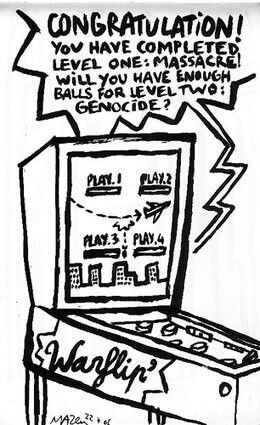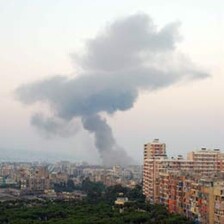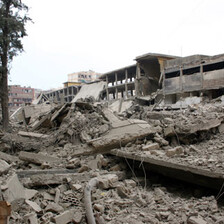Beirut 23 July 2006

“War Flipper” by Mazen Kerbaj. See more of his drawings.
The morning air was cool, but we were all plagued by swarms of flies that nipped at our ankles. You could swipe at them, but nothing could stop their annoying attacks. Each of us was bothered by a personal swarm, our own Hezbollah. Betsy was talking to a few of the children tormented by the flies. She began to tell them the folktale of the tailor who, when similarly tormented, had once made a desperate swipe and managed to kill seven flies with a single blow. He made himself a belt, proclaiming that he had killed seven with a single blow, and fellow villagers — assuming he had vanquished seven formidable foes — admired his uncanny strength. When a giant began to torment the village, devouring people at its whim, they turned to the tailor to save them. The terrified tailor made a bargain with the giant. If the giant could throw a rock over the nearby mountain, he could continue devouring the villagers, but if the tailor could do it, he must depart. The giant hurled his rock almost to the mountaintop but it rolled back down. The tailor then reached into his pocket and tossed his rock into the air. But he had tricked the giant by concealing a bird in his pocket. The bird flew away over the mountain and the village was saved. Because several children drifted toward the storyteller after the story had begun, Betsy had to start the story from the beginning more than once. The children didn’t seem to mind this. In fact, when the story was over, they wanted to hear it again.
For the Arab people of the eastern Mediterranean, Israel seems a voracious giant. Conventional power has been useless against the giant. Millions of Arab Davids casting their intifada of stones toward this Goliath, have resulted only in more devouring. Now, they can only place their hope in a non-material power—a divine storm that disperses value away from anything targetable. Hezbollah’s strategy of the swarm can never be completely defeated, but neither can it prevent the devouring, as Lebanon is now discovering.
Perhaps what is needed is an imaginative intervention that transforms the situation: an intifada of birds. The key for the tailor was twofold: he needed creativity and a willingness to talk to his foe. How far are we from this?
Lebanon has one advantage: the world has become a single stage: for a brief moment, it has the people’s gaze (it surely has paid more dearly for this than those who bought commercial time on World Cup broadcasts).
The simple transforming thing might be this: to acknowledge that the giant also bleeds and cries? Perhaps it can be tricked, in the presence of the world audience, into seeing our own horror at its devouring ways. Giants don’t have to be big and stupid like they are in fairy tales. But the Middle East is not a fairy tale. The giant has a bigger giant as an ally. The lines of power and influence among the Arabs of the Eastern Mediterranean lead to many actors, but these — like the giants — can bleed, and they can talk. Is anyone ready to listen?
Related Links
Patrick McGreevy heads up the American Studies Program at the American University of Beirut





